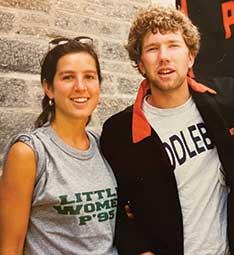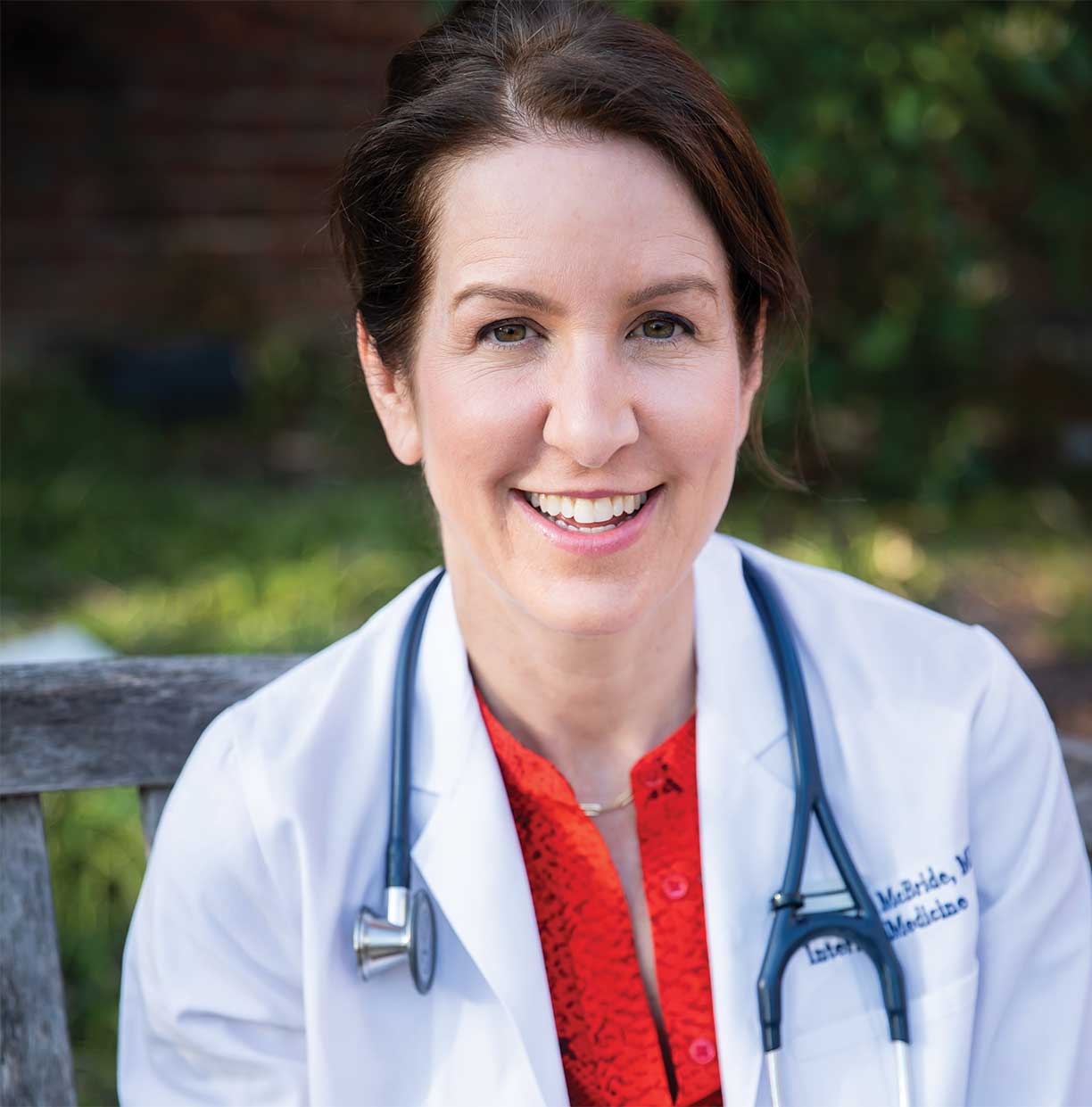Dr. Lucy McBride ’95 Found Her Voice During COVID
How the doctor turned pandemic fears into an opportunity to address overall health
Post-vaccine, McBride still devotes a portion of the newsletter to COVID, but also uses it to explore other areas of health care. “Pre-pandemic, I’d wanted to reach a broader audience about the relevance of mental health, thinking broadly about health as more than just your cholesterol and the number on the scale.” She adds that COVID has helped to illuminate “how vulnerable we are as individuals and as a society when faced with an existential threat.”
Today McBride is reaching audiences across multiple platforms: in her practice, through her newsletter, on committees, through public lectures, and more recently on her podcast. Launched in April, Beyond the Prescription features interviews with people who “may look on the surface to have everything figured out,” but beneath it all are struggling with physical and emotional challenges, McBride says.
She has also become a regular news commentator for various outlets, including CNN, MSNBC, and Bloomberg, and has addressed dozens of organizations, including the World Bank, Morgan Stanley, and Princeton. She served on the COVID-19 task force for a number of Washington schools, testified before a committee on the impact of COVID-19 on American health care, and is one of the founding members of Urgency of Normal — a group of doctors and scientists collaborating to help schools appropriately balance the harms of the virus and the harms of mitigation.
“The hardest and most gratifying part of my job is to help people effect behavioral change. If you can normalize their experience and then give them a place to go, some hope, and some guidance, and some support, then people are willing to make a change.” — Dr. Lucy McBride ’95
McBride, who grew up in Washington, D.C., knew since high school that she wanted to be a doctor but took opportunities to exercise the other side of her brain whenever possible. At Princeton, she majored in art history while taking pre-med courses, because she knew she would “be doing hard science for my whole life.” As a student, McBride met her husband, Thaddeus McBride ’95, and the couple lived in England for a year after they graduated. McBride did cystic fibrosis research for her Fulbright scholarship at Cambridge University and Thad played for the Cambridge United Football Club. She attended Harvard Medical School and completed her residency at Johns Hopkins University. During her internship year, McBride became pregnant with her first son. She describes that period of her life as the hardest thing she’s ever done. “[It]really forced me to reckon with my own emotional health and realize what mattered to me most was being a mom,” she says. “It forced me to abandon the idea that you could cross every ‘T’ and dot every ‘I’. That was good.”

McBride brings that philosophy to her podcast. “One of the things I have learned through this public-facing role and through my writing is that health is about so much more than the absence of disease,” she says, “and modern medicine defines health so narrowly.” The podcast is her vehicle for “helping people understand that not only are they vulnerable to disease, they’re also vulnerable to despair,” and helping them with both. She does this through stories. “When you are trying to educate or counsel a patient on making a behavioral change, you can tell them what to do all day long, but it’s really when they hear stories that normalize their experience and with which they can identify then they think, ‘Oh, OK, that’s me. I can do that too.’”
One of her first guests was Mika Brzezinski, journalist and co-anchor of Morning Joe, and they discussed her relationship with food. Other guests include her patient Kathleen Buhle, Hunter Biden’s first wife and author of If We Break: A Memoir of Marriage, Addiction and Healing. Buhle talked openly about the relationship trauma, denial, and pain that informed her own health, and credits McBride with saving her life. “When I felt like I couldn’t share my painful secrets with anyone, I let Lucy in,” Buhle tells PAW by email.
It is not surprising that the podcast has taken off. Average monthly downloads per episode of Beyond the Prescription have consistently placed it in the top 20th percentile of all podcasts published, according to metrics by podcast distribution platform Libsyn. Her podcast has been downloaded more than 25,000 times.
Guests are starting to call her, “because apparently, it’s cool to be vulnerable,” she laughs. “The hardest and most gratifying part of my job is to help people effect behavioral change. If you can normalize their experience and then give them a place to go, some hope, and some guidance, and some support, then people are willing to make a change.”
McBride makes it clear that her accomplishments are a group effort. She has a professional team to help with the podcast, social media, and scheduling. And then there is her neighbor, Princeton senior Page Lester, who has been helping her “forever” to edit and format the newsletter. She also cut back her practice in 2021 to make room “to help reach a wider audience with these universal themes.” Of course, that still includes navigating COVID. “As we move toward endemicity and face the unpleasant reality that COVID is here to stay, it’s particularly important to name and normalize our fear, to practice self-compassion, and to give each other latitude as we adjust to a post-pandemic world,” McBride says.
Ultimately her goal is to continue helping others, she says. McBride recently signed a book deal with Simon and Schuster to continue the podcast theme of a holistic approach to wellness, while also delving into some of her own struggles with vulnerability, anxiety, and postpartum depression. “I’m going to throw myself under the bus,” she laughs.












1 Response
Rebecca Thorsness ’13
3 Years AgoUrgency of Equity
I was dismayed the profile of Dr. Lucy McBride ’95 (Princetonians, October issue) lacked any critical analysis of her “Urgency of Normal” activities. While many selflessly rose to the challenge presented by the COVID pandemic, others like Dr. McBride have used it as an opportunity for self-promotion far beyond the scope of their expertise. Media-savvy physicians like Dr. McBride have provided politicians cover to eliminate the few remaining public health precautions, but low-income and minoritized children and their caregivers continue to carry the greatest burden of disease and death. Though the current hyperendemic state of COVID is very different from the early pandemic in 2020, reverting to “normal” disproportionately harms the most vulnerable members of society. I encourage PAW to highlight alumni who are tackling the pandemic in evidence- and equity-based ways, rather than those who have been most successful at chasing the spotlight.